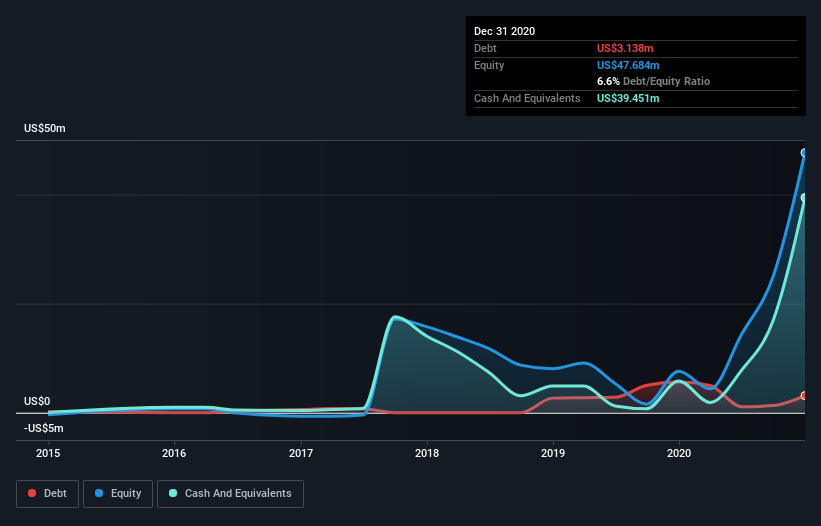- United States
- /
- Auto
- /
- OTCPK:FUVV
Here's Why Arcimoto (NASDAQ:FUV) Can Manage Its Debt Despite Losing Money
Legendary fund manager Li Lu (who Charlie Munger backed) once said, 'The biggest investment risk is not the volatility of prices, but whether you will suffer a permanent loss of capital.' When we think about how risky a company is, we always like to look at its use of debt, since debt overload can lead to ruin. We can see that Arcimoto, Inc. (NASDAQ:FUV) does use debt in its business. But the more important question is: how much risk is that debt creating?
Why Does Debt Bring Risk?
Debt and other liabilities become risky for a business when it cannot easily fulfill those obligations, either with free cash flow or by raising capital at an attractive price. Part and parcel of capitalism is the process of 'creative destruction' where failed businesses are mercilessly liquidated by their bankers. However, a more usual (but still expensive) situation is where a company must dilute shareholders at a cheap share price simply to get debt under control. By replacing dilution, though, debt can be an extremely good tool for businesses that need capital to invest in growth at high rates of return. The first thing to do when considering how much debt a business uses is to look at its cash and debt together.
Check out our latest analysis for Arcimoto
How Much Debt Does Arcimoto Carry?
You can click the graphic below for the historical numbers, but it shows that Arcimoto had US$3.14m of debt in December 2020, down from US$5.63m, one year before. However, it does have US$39.5m in cash offsetting this, leading to net cash of US$36.3m.

How Strong Is Arcimoto's Balance Sheet?
Zooming in on the latest balance sheet data, we can see that Arcimoto had liabilities of US$2.91m due within 12 months and liabilities of US$2.65m due beyond that. On the other hand, it had cash of US$39.5m and US$17.1k worth of receivables due within a year. So it can boast US$33.9m more liquid assets than total liabilities.
This short term liquidity is a sign that Arcimoto could probably pay off its debt with ease, as its balance sheet is far from stretched. Succinctly put, Arcimoto boasts net cash, so it's fair to say it does not have a heavy debt load! The balance sheet is clearly the area to focus on when you are analysing debt. But it is future earnings, more than anything, that will determine Arcimoto's ability to maintain a healthy balance sheet going forward. So if you want to see what the professionals think, you might find this free report on analyst profit forecasts to be interesting.
Over 12 months, Arcimoto reported revenue of US$2.2m, which is a gain of 119%, although it did not report any earnings before interest and tax. So its pretty obvious shareholders are hoping for more growth!
So How Risky Is Arcimoto?
Statistically speaking companies that lose money are riskier than those that make money. And the fact is that over the last twelve months Arcimoto lost money at the earnings before interest and tax (EBIT) line. And over the same period it saw negative free cash outflow of US$19m and booked a US$18m accounting loss. Given it only has net cash of US$36.3m, the company may need to raise more capital if it doesn't reach break-even soon. The good news for shareholders is that Arcimoto has dazzling revenue growth, so there's a very good chance it can boost its free cash flow in the years to come. High growth pre-profit companies may well be risky, but they can also offer great rewards. When analysing debt levels, the balance sheet is the obvious place to start. But ultimately, every company can contain risks that exist outside of the balance sheet. Case in point: We've spotted 4 warning signs for Arcimoto you should be aware of.
Of course, if you're the type of investor who prefers buying stocks without the burden of debt, then don't hesitate to discover our exclusive list of net cash growth stocks, today.
If you’re looking to trade Arcimoto, open an account with the lowest-cost* platform trusted by professionals, Interactive Brokers. Their clients from over 200 countries and territories trade stocks, options, futures, forex, bonds and funds worldwide from a single integrated account. Promoted
New: Manage All Your Stock Portfolios in One Place
We've created the ultimate portfolio companion for stock investors, and it's free.
• Connect an unlimited number of Portfolios and see your total in one currency
• Be alerted to new Warning Signs or Risks via email or mobile
• Track the Fair Value of your stocks
This article by Simply Wall St is general in nature. It does not constitute a recommendation to buy or sell any stock, and does not take account of your objectives, or your financial situation. We aim to bring you long-term focused analysis driven by fundamental data. Note that our analysis may not factor in the latest price-sensitive company announcements or qualitative material. Simply Wall St has no position in any stocks mentioned.
*Interactive Brokers Rated Lowest Cost Broker by StockBrokers.com Annual Online Review 2020
Have feedback on this article? Concerned about the content? Get in touch with us directly. Alternatively, email editorial-team (at) simplywallst.com.
About OTCPK:FUVV
Arcimoto
Designs, develops, manufactures, sells, and rents three-wheeled electric vehicles in the United States.
Low risk with weak fundamentals.
Similar Companies
Market Insights
Community Narratives



